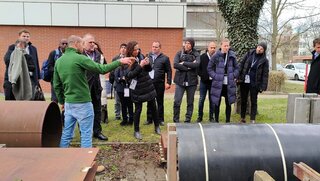The first hydrogen strategy for Israel
August, 2023

Background
The German-Israeli Energy Partnership was launched in 2022. This partnership constitutes a joint effort to support innovative projects, the exchange of best practices to mitigate the effects of climate change and ensure a smooth transition towards a carbon-free economy whilst bolstering economic growth in Germany and Israel. This is done by bringing together policymakers, leading entrepreneurs, and experts in relevant fields to tackle some of the most pressing challenges in topics ranging from cyber security and the protection of critical energy infrastructure to ramping up the production, the storage, and the transportation of energy from renewable and sustainable sources.
Challenge and Goal
Alongside the expansion of renewable energy production through technologies such as photovoltaics or wind turbines and adapting the energy grid to seamlessly handle the increased load and volatility inherent to renewable energy sources, hydrogen has been identified as a key element to use as a substitution element for gas. Consequently, (sustainable) hydrogen is a central focus in Germany's global energy diplomacy and a dynamic theme in the German-Israeli Energy Partnership.
Israel to date is still highly dependent on natural gas. To satisfy this need, it extracts gas from the vast offshore gas reserves along its coast. However, demographic projections estimate the demand for energy to increase over the coming decades and the industrial energy demand in Israel to grow. This coupled with ever-more ambitious climate targets requires Israel to branch out and seek new ways of decarbonising their economy and energy consumption.
Action (!) taken
At the beginning of 2023, Israel had no comprehensive hydrogen policy and minimal engagement with the topic. In March, the partnership hosted a series of professional workshops and a high-level expert trip of policy decision makers to Germany, focussing on hydrogen production methods, safety requirements, and the potential repurposing of natural gas infrastructure.
This collaborative endeavour aimed not only to explore possibilities for enhanced cooperation between Germany and Israel but also to leverage the unique strengths of each nation towards shared objectives in the dynamic field of hydrogen.
Impact
Due to these activities, a paradigm shift was attained: It manifested in Israel's release of its inaugural hydrogen policy in May 2023 and its efforts to establish hydrogen valleys in Israel—concrete testaments to the substantial strides made possible by the Israeli-German Energy Partnership’s activities.